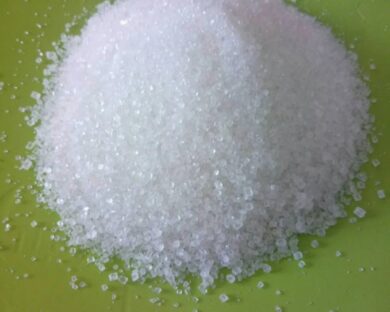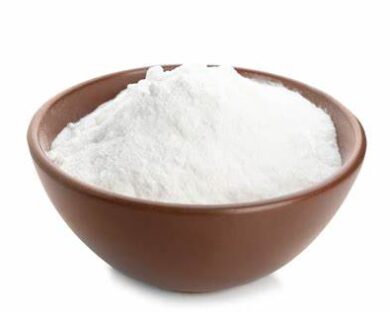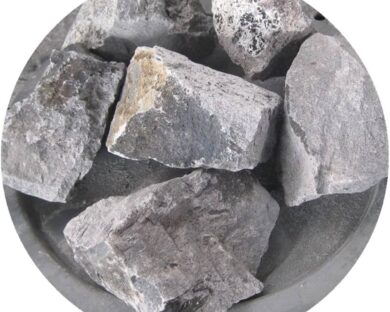Potassium Nitrite
Potassium Nitrite
Potassium nitrite, with the chemical formula KNO2, is a compound composed of potassium, nitrogen, and oxygen. It is a white to yellowish crystalline solid that is soluble in water. Potassium nitrite is primarily used in the manufacture of heat-transfer salts, which are used in solar energy systems and as antifreeze agents. It also finds application as a corrosion inhibitor in industrial processes, particularly in cooling systems and metal treatment. Additionally, potassium nitrite is employed in the production of pharmaceuticals and as a reagent in chemical synthesis, such as in the preparation of certain dyes and pigments.
USES AND APPLICATIONS FOR Potassium Nitrite
INDUSTRIES
It is used in numerous industrial applications like:-
- Heat-Transfer Salts: Used in the manufacture of heat-transfer salts for solar energy systems and antifreeze agents.
- Corrosion Inhibitor: Employed in industrial processes as a corrosion inhibitor, especially in cooling systems and metal treatment.
- Pharmaceuticals: Used in the production of pharmaceuticals.
- Chemical Synthesis: Acts as a reagent in chemical synthesis, particularly in the preparation of dyes and pigments.
Potassium Nitrite:
Potassium nitrite, with the chemical formula KNO2, is a compound composed of potassium, nitrogen, and oxygen. It is a white to yellowish crystalline solid that is soluble in water. Potassium nitrite is primarily used in the manufacture of heat-transfer salts, which are used in solar energy systems and as antifreeze agents. It also finds application as a corrosion inhibitor in industrial processes, particularly in cooling systems and metal treatment. Additionally, potassium nitrite is employed in the production of pharmaceuticals and as a reagent in chemical synthesis, such as in the preparation of certain dyes and pigments.
Uses:
1. Food Preservative: Potassium nitrite is commonly utilized in the food industry as a preservative, particularly in cured meats like bacon, ham, and sausages. It inhibits the growth of harmful bacteria, such as Clostridium botulinum, which can cause botulism. Additionally, it imparts a characteristic pink color and enhances the flavor of processed meats, contributing to their overall quality and shelf life.
2. Corrosion Inhibitor: In industrial applications, potassium nitrite is employed as a corrosion inhibitor for metals, especially in cooling water systems and automotive antifreeze formulations. By forming a protective film on metal surfaces, it helps prevent corrosion and extends the lifespan of equipment and infrastructure, reducing maintenance costs and enhancing operational efficiency.
3. Pharmaceutical Applications: Potassium nitrite has pharmaceutical significance, primarily as a precursor in the synthesis of nitrogen-containing compounds and pharmaceutical intermediates. It serves as a starting material for the preparation of various medications, including nitric oxide donors, vasodilators, and pharmaceutical salts. Its role in organic synthesis contributes to the development of new drugs and therapeutic agents for various medical conditions.
4. Agricultural Use: In agriculture, potassium nitrite is utilized as a source of nitrite nitrogen in fertilizer formulations. It provides essential nutrients to plants for healthy growth and development, promoting higher yields and improved crop quality. Additionally, it can help enhance soil fertility and mitigate nitrogen deficiencies in agricultural soils, supporting sustainable farming practices and ensuring optimal crop production.
5. Laboratory Reagent: Potassium nitrite serves as a versatile laboratory reagent in chemical synthesis, analytical chemistry, and research applications. It is employed in various chemical reactions, such as diazotization, nitrosation, and oxidation processes. Its ability to generate nitric oxide (NO) gas under acidic conditions makes it valuable in experimental studies and as a precursor for the preparation of NO-containing compounds.
6. Textile Industry: In the textile industry, potassium nitrite finds application in the dyeing and printing of fabrics. It acts as a reducing agent and assists in the development of specific dye colors, especially in azo dye chemistry. Moreover, it helps improve the colorfastness and overall dyeing performance of textile materials, ensuring vibrant and durable coloration.
7. Rocket Propellant Additive: Potassium nitrite is occasionally used as an additive in solid rocket propellants to enhance their combustion characteristics. It contributes to the generation of gases and increases the propellant’s thrust efficiency and burn rate. Its inclusion in propellant formulations can result in improved propulsion performance and stability during rocket propulsion systems’ operation.
8. Water Treatment: Potassium nitrite is employed in water treatment processes, particularly for controlling microbial growth and preventing biofouling in industrial water systems. It inhibits the growth of algae, bacteria, and other microorganisms in water reservoirs, cooling towers, and pipelines. By maintaining water quality and preventing biological contamination, it helps ensure the integrity and efficiency of water treatment facilities and distribution networks.





